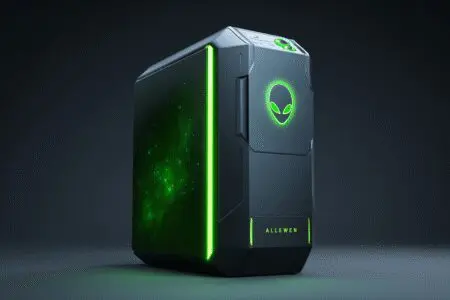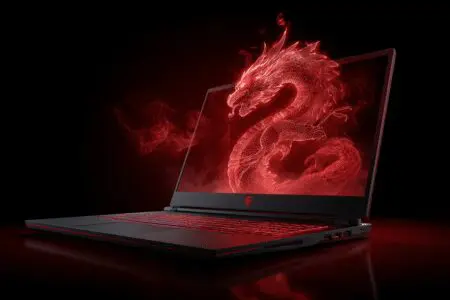Did you know that the average PC gamer spends over eight hours a week playing? In that time, you don’t want to be fighting lag, low frame rates, or a system that sounds like a jet engine. You want to be immersed. The single biggest decision that shapes this experience is your choice of machine. So, the big question is, what gaming PC should I buy? It’s a question I’ve wrestled with myself for over two decades, going from nervously buying my first prebuilt machine to the terror and triumph of building my own from a pile of boxes.
This guide isn’t just a list of parts. It’s a map to navigate the most critical choice you’ll make: buying a ready-to-go prebuilt PC or taking the plunge into the rewarding world of custom building. We’ll break down the real pros and cons, decode the jargon, and set a realistic budget so you can get the best possible machine for your money.
More in Pre-built Gaming Category
What Is the Best ASUS Gaming Laptop
The Great Debate: Should You Buy a Prebuilt or Build Your Own?
This is the classic starting point, and for good reason. Your answer here sets the entire tone for your PC gaming journey. One path is about convenience and security, while the other is about control and customization. There’s no single right answer, only the right answer for you.
What’s the Real Difference Between a Prebuilt and a Custom PC?
At its core, the difference is simple. A prebuilt PC is a complete, assembled system you buy off the shelf or from a boutique builder. You click “buy,” it arrives, you plug it in, and you start gaming. Conversely, a custom PC is one you assemble yourself, choosing every single component from the processor to the case fans.
I remember my first custom build. I had a motherboard on my desk, a CPU in a tiny plastic case, and a genuine fear that I was about to destroy a few hundred dollars with a single jolt of static electricity. But after hours of following a YouTube video, the moment it posted to BIOS for the first time was pure magic. That’s the trade-off in a nutshell: the immediate convenience of a prebuilt versus the ultimate satisfaction of a custom build.
Why Would Anyone Choose a Prebuilt Gaming PC Today?
In the past, choosing a prebuilt was often seen as the “lesser” option among enthusiasts. However, the market has changed significantly, and there are compelling reasons to go this route. In fact, for many people, it’s the smarter choice.
Here’s why a prebuilt might be perfect for you:
- Ultimate Convenience: The PC arrives at your door ready to go. There is no need to worry about component compatibility, assembly, or installing the operating system. You get to the fun part—gaming—immediately.
- All-in-One Warranty and Support: If something goes wrong, you have one phone number to call or one email to send. You don’t have to diagnose which part failed; that’s the company’s job. This peace of mind is a massive selling point.
- Access to Hard-to-Find Parts: During major GPU launches, prebuilt manufacturers often get priority access to stock. Sometimes, buying a whole prebuilt system is the easiest (or only) way to get your hands on a brand-new, in-demand graphics card without paying scalper prices.
- Potentially Lower Overall Cost (Sometimes): Because system integrators buy components in bulk, they can sometimes offer a complete package for a price that’s competitive with, or even cheaper than, the cost of sourcing all the parts yourself, especially when you factor in the included Windows license.
What Are the Downsides of Buying a Prebuilt System?
Of course, that convenience comes with some important trade-offs. The business model of large-scale PC builders often involves cutting costs in places the average buyer might not notice, which can lead to headaches down the road.
Be aware of these potential cons:
- The “Mystery Meat” Components: To maximize profit, many prebuilt systems use high-quality, name-brand CPUs and GPUs for marketing but skimp on the motherboard, power supply (PSU), and RAM. They might use slow RAM, a barebones motherboard with few features, or a low-quality PSU that could struggle under load.
- Proprietary Parts and Poor Upgradeability: Major brands like Dell and HP are notorious for using non-standard cases, motherboards, and power supplies. This makes future upgrades incredibly difficult, if not impossible. You might not be able to simply swap in a new graphics card if it doesn’t fit the case or if the proprietary PSU doesn’t have the right connectors.
- Bloatware: Prebuilt PCs often come loaded with pre-installed software, antivirus trials, and other applications you don’t need. This “bloatware” can slow down your system from day one and is a pain to remove.
- The “Assembly Fee” Premium: Ultimately, you are paying for the service of having someone build the computer for you. While sometimes competitive, the price is often higher than the sum of the individual parts.
The Custom Build Path: A Journey for the Brave (and Patient)
Building your own PC is a rite of passage for many gamers. It’s an experience that teaches you exactly how a computer works and gives you a deeper appreciation for the technology you use every day. It seems intimidating, but it’s more accessible now than ever before.
Is Building a PC Really as Hard as It Sounds?
Honestly? No. It’s often described as “adult LEGOs,” and that’s not far from the truth. Most components only fit in one specific slot, and the process is highly standardized. The most challenging part isn’t the physical assembly; it’s the initial research and component selection.
Today, resources like YouTube have completely demystified the process. You can find thousands of step-by-step build guides that walk you through every single connection. The feeling of hitting the power button for the first time and seeing your creation come to life is a reward in itself. It transforms you from a simple user into the master of your machine.
What are the Key Advantages of a DIY Gaming Rig?
Taking the time to build your own PC offers benefits that go far beyond just saving a bit of money. You are in complete control, and that allows you to craft a system perfectly tailored to your needs.
- Total Component Control: You choose every single part. This means you can get a high-quality power supply for system stability, a motherboard with all the ports and features you need, and fast RAM that won’t bottleneck your processor.
- Superior Quality for Your Dollar: Since you’re not paying for an assembly service or a company’s marketing budget, more of your money goes directly into the components. This often results in a more powerful and reliable machine for the same price as a prebuilt.
- Built for the Future: By choosing a standard case, motherboard, and power supply, you ensure that your system will be easy to upgrade for years to come. When a new GPU comes out, you can simply swap it in without worrying about proprietary limitations.
- A Clean, Bloatware-Free Experience: You start with a clean installation of Windows. There are no unnecessary programs or annoying pop-ups, just a pure, fast operating system ready for your games.
Let’s Be Honest, What Are the Risks of Building It Yourself?
It’s not all sunshine and rainbows. The DIY route requires you to take on the role of manufacturer, tech support, and troubleshooter.
- You Are Your Own Tech Support: This is the big one. If the PC doesn’t turn on, or if you’re getting mysterious blue screens, it’s on you to figure out why. This can involve hours of searching forums and testing components to isolate the problem.
- The Time Investment: The research phase can take hours, if not days. The build itself can take an afternoon or longer for a first-timer. It’s a significant time commitment before you can even start playing.
- The “Oops” Factor: While it’s less common than you might think, there is always a small risk of damaging a component during installation. A bent CPU pin or a fried motherboard from a static shock can be a costly mistake.
- Component Compatibility: While tools like PCPartPicker are incredibly helpful, you can still run into weird compatibility issues between certain parts. Ensuring everything will play nicely together requires careful research.
Decoding the Components: What Do You Actually Need?
Whether you’re going prebuilt or custom, you need to understand the key components that determine a PC’s gaming performance. This knowledge will help you spot a good deal and avoid a bad one.
How Do I Choose the Right CPU for Gaming?
The Central Processing Unit (CPU) is the brain of your computer. For gaming, the two main players are Intel (Core i5, i7, i9) and AMD (Ryzen 5, 7, 9). For years, one would dominate the other, but right now, the competition is fierce, which is fantastic for consumers.
For a pure gaming machine, you don’t need the CPU with the most cores. Most games still rely more on single-core speed. This means a mid-range CPU like an Intel Core i5 or an AMD Ryzen 5 or 7 is often the sweet spot, providing fantastic gaming performance without the high cost of a top-tier chip. Spending more on a Core i9 or Ryzen 9 provides diminishing returns for gaming and is better suited for tasks like video editing and streaming.
What Gaming PC Should I Buy When It Comes to the GPU?
The Graphics Processing Unit (GPU), or graphics card, is the single most important component for gaming. It’s what renders the images on your screen. This is where the largest chunk of your budget should go. The main competitors here are NVIDIA (GeForce RTX series) and AMD (Radeon RX series).
Your choice of GPU should be determined by the resolution of your monitor:
- 1080p (1920×1080): Still the most popular resolution for PC gaming. You can get fantastic, high-frame-rate performance at this resolution with an entry-level to mid-range card like an NVIDIA RTX 4060 or an AMD RX 7600 XT.
- 1440p (2560×1440): This is the new sweet spot for many gamers, offering a significant jump in visual clarity without the massive performance cost of 4K. Mid-range to high-end cards like the RTX 4070 Super or RX 7800 XT shine here.
- 4K (3840×2160): This is the premium, enthusiast-level experience. To play modern games smoothly at 4K with high settings, you’ll need a top-tier, expensive graphics card like an NVIDIA RTX 4080 Super or RTX 4090.
How Much RAM is Enough for a Modern Gaming PC?
Random Access Memory (RAM) is your computer’s short-term memory. For modern gaming, 16GB is the recommended minimum. It will handle almost any game you throw at it without issues. However, 32GB is quickly becoming the new standard. It gives you more headroom for multitasking—like running Discord, a web browser, and a game simultaneously—and provides excellent future-proofing. Anything more than 32GB is overkill for a system that is purely for gaming.
What Kind of Storage Should I Get for My Games?
Game install sizes are getting huge, so you need fast, plentiful storage. There are two main types you should consider:
- Solid State Drive (SSD): This is absolutely essential. Your operating system (Windows) and your most-played games should be installed on an SSD. It dramatically reduces loading times for both your system and your games. An NVMe M.2 SSD, which looks like a small stick of RAM, is the fastest type and plugs directly into the motherboard.
- Hard Disk Drive (HDD): These are the older, mechanical drives. While much slower than SSDs, they are also much cheaper for mass storage. A large HDD is a great place to store older games you don’t play often, as well as movies, music, and photos.
Budgeting: How Much Should You Actually Spend?
Setting a budget is the most important step. A good gaming PC is an investment, but you don’t need to spend a fortune to have a great experience. The “best” PC is one that meets your performance goals without breaking the bank.
How Can I Set a Realistic Budget for My Gaming PC?
Think about what you want to achieve. Are you happy playing at 1080p, or do you have your heart set on a 1440p high-refresh-rate monitor? Your performance target will define your budget. Here are a few common tiers, with prices reflecting the current market.
The Entry-Level Build (Around $800 – $1,200)
This is the perfect starting point for someone new to PC gaming or for anyone who primarily plays esports titles like Valorant, League of Legends, or Counter-Strike 2. This budget will get you a machine that delivers a fantastic 1080p experience, capable of running most modern games at medium to high settings with smooth frame rates.
The Mid-Range Sweet Spot (Around $1,200 – $2,000)
This is the tier where you get the most performance for your money. A PC in this price range is perfect for high-refresh-rate 1080p gaming or for making a solid jump to a 1440p monitor. For most people wondering what gaming PC to buy, this price range is the definitive answer. It’s the perfect balance of price and power that will keep you happy for years to come.
The High-End Enthusiast Build ($2,000+)
If you want the best of the best, this is the tier for you. A budget of over $2,000 allows for a PC that can handle demanding 1440p gaming at max settings or provide a comfortable entry into the world of 4K gaming. Here, you’re paying for top-of-the-line components that push the boundaries of visual fidelity and performance.
Making the Final Decision and Finding the Parts
Once you’ve decided on a path and a budget, it’s time to make it happen. Whether you’re configuring a prebuilt or creating a parts list, the final steps are about pulling the trigger with confidence.
Where Are the Best Places to Buy PC Components or Prebuilts?
For custom builders in the USA, a few retailers stand out. Newegg and Amazon have vast selections, while B&H Photo is another reliable option. However, if you are lucky enough to live near a Micro Center, it’s widely considered a paradise for PC builders, with competitive pricing and knowledgeable staff.
For prebuilt systems, you have two main categories. There are the boutique builders like NZXT, Corsair, Origin PC, and Maingear, who often use standard, off-the-shelf parts and offer excellent build quality. Then there are the major manufacturers like Dell (Alienware) and HP (Omen), who are more likely to use proprietary components but can offer aggressive pricing during sales events.
What Final Advice Can You Give Me Before I Pull the Trigger?
My single most important piece of advice is this: don’t suffer from analysis paralysis. PC technology moves at a blistering pace. There will always be a new, faster component right around the corner. Pick a budget, find the best parts you can get for it today, and go for it.
Remember that your PC is only one part of the equation. A great gaming experience also requires a great monitor. A high-end PC is wasted on an old 60Hz 1080p screen. Factor a good monitor into your overall budget.
Finally, if you choose to build, lean on the amazing community and resources available. The world of computer hardware can seem complex, but academic institutions like MIT offer comprehensive courses on computer system architecture that cover the deep fundamentals of how these machines work. Understanding these basics can give you an even greater appreciation for your rig. You can explore resources from their OpenCourseWare program right here.
The Journey is the Destination
In the end, whether you choose a prebuilt PC for its simplicity or a custom build for its endless possibilities, you’re opening the door to an incredible world of gaming. The best PC isn’t the one with the most expensive parts; it’s the one that lets you play the games you love. Both paths lead to the same place. One is just a direct flight, and the other is a scenic road trip.
Happy gaming.
Frequently Asked Questions

What should I consider when choosing components for my custom gaming PC?
You should consider the CPU (Intel or AMD), GPU matching your gaming resolution, RAM capacity and speed, storage type and size, motherboard features, power supply wattage and efficiency, as well as compatibility and upgrade options.
Why might I prefer building a custom gaming PC?
Building a custom gaming PC allows full control over component choices, potentially better quality parts, cost savings, and the fun and educational experience of assembling your own machine.
What are the main benefits of choosing a prebuilt gaming PC?
Prebuilt gaming PCs are ready to use, come with warranties and technical support, are assembled by experts ensuring compatibility, and save you time by eliminating the need to select and assemble individual parts.
Is it cheaper to buy or build a gaming PC in 2025?
In 2025, prebuilt PCs often offer competitive prices due to bulk purchasing and including Windows, but building your own can still be cheaper if you find good deals on parts, especially for high-end specifications.
Should I get a prebuilt gaming PC or build my own?
Deciding between a prebuilt gaming PC and building your own depends on whether you prefer ease of setup or full control over parts. Prebuilt PCs are ready to use immediately and come with warranties, while building your own can be more cost-effective and tailored to your needs.





